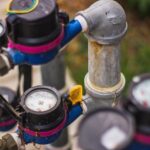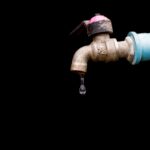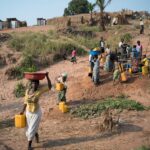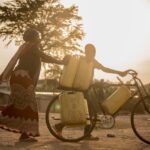Rural vs. Urban – The Water Divide in Nigeria
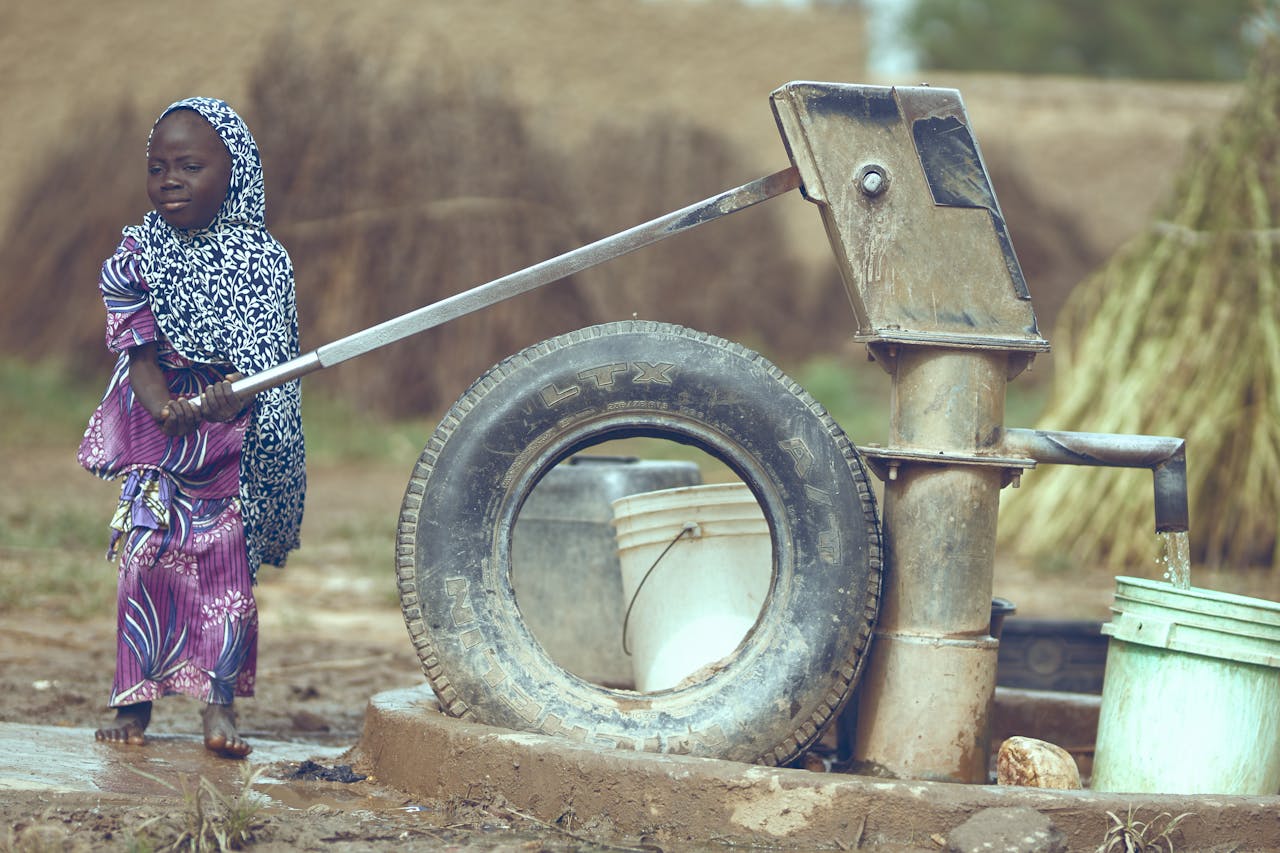
Water is life, as the saying goes. But in Nigeria, access to this essential resource can vary dramatically depending on where you live. Imagine two children – one in Lagos, the other in a small village in Borno State. Their daily experiences with water couldn’t be more different. This divide between rural and urban water access is more than just an inconvenience; it’s a critical issue affecting millions of Nigerians every day.
In this article, we’ll dive into the realities of water access across Nigeria, exploring how location shapes people’s relationship with this vital resource. From bustling city centres to remote rural communities, we’ll uncover the challenges, health impacts, and economic consequences of Nigeria’s urban-rural water divide.
Current State of Water Access in Nigeria
Let’s start with some eye-opening numbers.
According to data from the National Bureau of Statistics, about 70% of Nigerians have access to basic drinking water supply services. But this national figure hides a stark divide:
In urban areas, around 80% of people have access to basic water.
In rural areas, this drops to just 50%.
What does “basic water” mean? It’s water from an improved source, provided collection time is not more than 30 minutes for a round trip. An “improved” source could be piped water, boreholes, protected dug wells, protected springs, and packaged or delivered water.
But these numbers don’t tell the whole story. Even in urban areas where “access” is higher, the reality of that access – its reliability, quality, and cost – can vary widely.
Urban Water Challenges
City dwellers might have it better than their rural counterparts, but urban water access is far from perfect:
- Infrastructure issues:
Many Nigerian cities have old, crumbling water infrastructure. Pipes laid decades ago are now leaking or contaminated. In Lagos, for instance, the public water system reaches only about 40% of the city’s 35 million plus residents.
- Water quality concerns:
Even when water flows from taps, it’s not always safe to drink. Contamination from old pipes, irregular treatment, and pollution all contribute to poor water quality. Many urban Nigerians resort to boiling or chemically treating their tap water before drinking.
3. The rise of private water vendors: Where public water fails, private enterprises step in. Water trucks, popularly known as “mai ruwa” in northern Nigeria, and sachet water vendors are common sights in many cities. While they provide a crucial service, the cost can be high, and quality isn’t always guaranteed.
Rural Water Challenges
In rural areas, the water situation can be even more challenging:
- Lack of basic water infrastructure:
Many villages lack any form of improved water source. There are no pipes, no boreholes, sometimes not even protected wells.
2. Reliance on natural water sources: Rivers, streams, and unprotected wells are often the only water sources available. These can dry up during the dry season and are easily contaminated.
- Long-distance water collection:
In many rural areas, people (usually women and children) must walk long distances to collect water. A trip to collect water can take hours out of each day.
Health Implications of the Water Divide
The urban-rural water divide has serious health consequences:
- Waterborne diseases in rural areas:
Lack of clean water and proper sanitation in rural areas leads to high rates of diseases like cholera, typhoid, and dysentery. Children are particularly vulnerable.
- Urban health issues:
While less common, waterborne diseases also affect urban areas, especially in slums and areas with poor infrastructure. Additionally, the reliance on packaged water in cities creates plastic waste, which can lead to environmental health issues.
- Impact on child mortality:
According to UNICEF, diarrheal diseases caused by poor water and sanitation are the second leading cause of death in children under five in Nigeria. The majority of these deaths occur in rural areas.
Economic Impact
The water divide doesn’t just affect health – it has significant economic consequences too:
- Time and productivity lost: In rural areas, hours spent collecting water are hours not spent on education, income-generating activities, or rest. This particularly affects women and girls.
- Cost of water: Ironically, poor urban residents often pay more for water than wealthier ones. Those without access to public water might spend up to 10% of their income on water from vendors.
- Effect on agriculture: In rural areas, lack of reliable water sources can limit agricultural productivity. This affects not only rural livelihoods but also food security for the entire country.
The water divide between rural and urban Nigeria is more than just a matter of convenience. It’s a complex issue that touches on health, economics, gender equality, and national development. Understanding this divide is the first step towards bridging it and ensuring that all Nigerians, regardless of where they live, have access to this most basic of human needs.
Government Initiatives and Policies
The Nigerian government has recognized the water challenge and has put several initiatives in place:
- National Water Policy: Launched in 2000 and revised in 2004, this policy aims to ensure sustainable access to safe and sufficient water for all Nigerians. It emphasises community participation and gender mainstreaming.
- WASH Action Plan: In 2018, Nigeria declared a state of emergency in the water, sanitation, and hygiene (WASH) sector and launched an action plan to address the crisis.
- Rural Water Supply and Sanitation Programme: This initiative focuses specifically on improving water access in rural areas through borehole drilling and community-led total sanitation approaches.
However, implementation remains a challenge. Urban areas often receive more attention and funding, while rural projects can suffer from lack of maintenance and follow-through.
Role of Non-Governmental Organizations
Where government efforts fall short, NGOs often step in:
- Rural water provision: Organizations like WaterAid Nigeria work extensively in rural areas, drilling boreholes and training communities in water management.
- Urban water projects: NGOs also work in cities, often focusing on slum areas overlooked by government initiatives. They may provide water kiosks or work on improving sanitation facilities.
- Advocacy: Many NGOs like Aqua Maya play a crucial role in advocating for better water policies and holding the government accountable.
Challenges faced by NGOs include securing long-term funding, coordinating with government efforts, and ensuring community ownership of projects.
Technological Solutions
Technology is offering new possibilities for addressing the water divide:
- Rural innovations: Solar-powered boreholes are gaining popularity in rural areas, providing a sustainable water source. Simple, low-cost water filters are also making a difference.
- Urban solutions: In cities, new water treatment technologies are being explored, including advanced filtration systems and smart metering to reduce water loss.
- Mobile technology: Apps that help locate functioning water points or report broken ones are being used in both rural and urban areas. Mobile payment systems are also making it easier for communities to manage water fees.
Social and Cultural Factors
Water isn’t just a resource; it’s deeply embedded in social and cultural practices:
- Traditional water management: Many rural communities have longstanding practices for managing water resources, like rainwater harvesting or protection of sacred water bodies. These practices can be valuable but are often overlooked in modern water projects.
- Changing urban patterns: In cities, the rise of bottled and sachet water is changing how people relate to water. There’s a growing perception that tap water isn’t safe, even when it is.
- Gender dynamics: In both rural and urban areas, women and girls bear the primary responsibility for water collection. This impacts their education, health, and economic opportunities.
Environmental Considerations
Water access is intimately tied to environmental factors:
- Climate change impact: Nigeria is experiencing more extreme weather patterns, with both droughts and floods becoming more common. This affects both rural water sources and urban water infrastructure.
- Pollution: In urban areas, industrial and domestic pollution threatens water sources. In rural areas, poor sanitation practices can contaminate groundwater.
- Sustainability concerns: Over-extraction of groundwater is a growing concern, especially in urban areas where private boreholes are common.
Case Studies
Let’s look at some real-world examples:
- Rural success:
In Dass Local Government Area of Bauchi State, a community-led approach to water management has dramatically improved access. By involving local leaders and training community members to maintain water points, the project has achieved long-term sustainability.
- Urban innovation:
Lagos State has partnered with private companies to establish water kiosks in underserved areas. These kiosks provide affordable, clean water and are often run by local entrepreneurs, creating jobs in the community.
- Lessons learned:
A failed rural water project in Enugu State highlights the importance of community engagement. Boreholes were drilled without consulting the community on location or management, leading to abandonment of the facilities.
These case studies show that successful water projects need more than just technology – they require community involvement, good management, and consideration of local contexts.
The water divide between rural and urban Nigeria is complex, but these sections show that there are many efforts underway to address it. From government policies to grassroots initiatives, technological innovations to cultural practices, there are multiple angles from which this challenge is being tackled. However, it’s clear that more coordinated and sustained effort is needed to ensure all Nigerians have access to clean, safe water.
The Way Forward
Bridging Nigeria’s rural-urban water divide is a big task, but there are clear steps we can take:
Strategies for improvement:
- The government needs to put more money into water systems, especially in rural areas where the need is greatest.
- We should encourage businesses to work with the government on water projects. This can bring in new ideas and resources.
- Communities should be trained to manage their own water systems. When people have a stake in something, they’re more likely to take care of it.
- We need to teach people about water conservation and good hygiene. Knowledge is power, after all.
Policy recommendations:
- We need stronger rules about water quality, and we need to enforce them in both cities and villages.
- The government should make special plans to tackle the unique problems rural areas face with water.
- We should create rewards for businesses that help provide water in areas that don’t have enough.
Community engagement:
- Local people should have a say in water projects from the very beginning. They know their needs best.
- We should set up water user groups in communities to look after local water sources.
- Traditional leaders can play a big role in promoting better water access. Their voice carries weight in many communities.
This is where organizations like Aqua Maya come in. Aqua Maya is a U.S. 501c3 nonprofit that’s doing important work in West Africa, including Nigeria. At Aqua Maya, we are not just drilling wells and walking away. Instead, we’re partnering with local communities to create lasting change.
For example, we work on:
- Building sustainable water infrastructure that communities can maintain themselves
- Education programs about hygiene and water conservation
Aqua Maya’s approach shows how outside help can make a real difference when it’s done right, by working with communities, not just for them.
Conclusion
The gap between rural and urban water access in Nigeria is more than just numbers on a page. It’s about real people facing real challenges every day:
Recap of the divide:
- City folks generally have better water access, but they still face problems with reliability and quality.
- In rural areas, many people lack even basic water systems, which affects their health and ability to earn a living.
Why this matters:
- Better water access means healthier people, stronger economies, and a better quality of life for all Nigerians.
- Closing the gap between rural and urban water access can help make Nigeria a fairer, more equal country.
What we can do:
- The government needs to make water access a top priority, both in their policies and their budget.
- Organizations like Aqua Maya show how nonprofits and businesses can help fill in the gaps and bring new solutions.
- Every Nigerian can do their part by using water wisely and supporting community water projects.
Our mission at Aqua Maya to bring clean water to 10 million people in West Africa is an ambitious goal, but it’s the kind of thinking we need. Our focus on reducing child deaths from water-related diseases reminds us of what’s really at stake.
As we’ve seen throughout this article, the water divide in Nigeria is a complex problem. But it’s not an impossible one. With the right policies, community involvement, and support from Aqua Maya and other organizations, we can work towards a future where every Nigerian, whether they live in a big city or a small village, has access to clean, safe water.
This isn’t just about convenience. It’s about health, opportunity, and basic human dignity. By addressing the water divide, we’re not only improving lives, we’re building a stronger, more equitable Nigeria for all.
Sources:
- Ishaku, H. , Majid, M. , Ajayi, A. and Haruna, A. (2011) Water Supply Dilemma in Nigerian Rural Communities: Looking Towards the Sky for an Answer. Journal of Water Resource and Protection, 3, 598-606. doi: 10.4236/jwarp.2011.38069. https://www.scirp.org/journal/paperinformation?paperid=6993
- https://www.worldbank.org/en/news/feature/2021/05/26/nigeria-ensuring-water-sanitation-and-hygiene-for-all
- https://theconversation.com/lagos-has-a-water-and-sanitation-crisis-what-the-state-and-city-can-do-164971
- https://documents1.worldbank.org/curated/en/099062123034023646/pdf/P1750310c8d0390000afa70e5c583aa3b87.pdf
- https://www.unicef.org/nigeria/water-sanitation-and-hygiene
- https://www.wateraid.org/ng/national-action-plan
- https://pubs.sciepub.com/wjac/1/4/6/index.html
- https://www.thisdaylive.com/index.php/2024/07/17/lagos-launches-partnership-to-attract-private-investment-in-water-sector/



